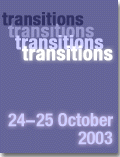
|
 |
Papers from the Colloquium
Theme 4: Evidence and Context
Respondent: Philip Dawid
Department of Statistical Science, University College London
I would like to start by outlining recent developments relating
to Evidence in the specific context of University College London.
I have spent most of the last year putting together an interdisciplinary
programme on "Evidence, Inference and Enquiry", bidding
for a programme grant from the Leverhulme Trust (now augmented
by ESRC). We have now heard that this has been successful, and
are about to set the programme in motion.
When I first circulated colleagues around UCL for expressions
of interest, I was overwhelmed with responses, from about 25 different
departments. The final programme involves 11 departments (in 7
faculties): Statistical Science, Crime Science, Geography, Science
and Technology Studies, Economics, Hebrew and Jewish Studies, Primary
Care and Population Studies, Psychology, Computer Science, Educational
and Professional Development, and Laws. Many others will be involved
informally.
It has been fascinating to me to have this opportunity to meet
and interact with people I would not normally have much contact
with, and to have my eyes opened to the wide range of approaches
and assumptions that different disciplines bring to intellectual
enquiry. In particular, it has been very educational -- and challenging
-- to try to come to some appreciation of the differences between
the approaches of the "two cultures", Science and Humanities.
If I can be allowed an obviously over-simplified generalization,
I would say that the sciences struggle for unification, while the
humanities celebrate diversity. However, there need not be conflict
between these approaches, and I would hope that the interdisciplinary
nature of our Evidence Programme might be captured through the
slogan
"Unity in Diversity".
Many participants in the Evidence Programme rightly wish to consider
the special features of the construal and uses of evidence in their
particular disciplines. What I personally want to do is to emphasise
common logical features and principles of thinking about evidence,
which can be applied irrespective of the underlying field of discourse,
assumptions and conclusions. Just as Aristotelian logic can be
applied correctly to ridiculous premises, or badly but nevertheless
to a true conclusion, we should to be able to identify and study
the logical and methodological principles that underlie valid analysis
of evidence, over and above variations in its subject matter and
specific applications. With this in mind, I was particularly interested
in Jason Davies' extract from Herodotus. Here we have a rare (perhaps
unique?) example of the experimental method applied to historical
research. As Jason says, we would nowadays regard the whole enterprise
as ludicrous, but I can't help but be impressed at what -- within
its own terms -- seems to be a carefully conceived and entirely
appropriate logical approach to the gathering and interpretation
of evidence to throw light on a hypothesis of interest.
Jason has pointed out the importance of hypotheses in relation
to the interpretation of evidence. Indeed one could say that without
explicit consideration of hypotheses we have no right to speak
of
"evidence" at all, but merely have "data".
This is perhaps the most fundamental principle of "subject-blind"
evidence.
Jason also argues for the importance of narrative -- and, at a
still broader level, "discourse" -- in making sense of
evidence. This I find more questionable. It seems to me that there
are many important applications where narrative is irrelevant,
or at any rate takes a back seat -- for example, in the statistical
design and interpretation of clinical trials to determine whether
a newly formulated pharmaceutical preparation works better at curing
patients than the standard medical treatment. And even if we agree
that it is human nature to wish for a coherent narrative and achieve
"closure" in our understandings of evidence, that still
leaves open the question whether this is a mere psychological peculiarity
of the human brain, or whether it has a more fundamental philosophical
and methodological place.
This general question of the role of narrative, both in general
and in particular, is one of a number of themes that we hope to
explore within the Evidence Programme. Watch this space!
|
 |


|


![]() +44 (0)20 7679 2000 - Copyright © 1999-2006
UCL
+44 (0)20 7679 2000 - Copyright © 1999-2006
UCL